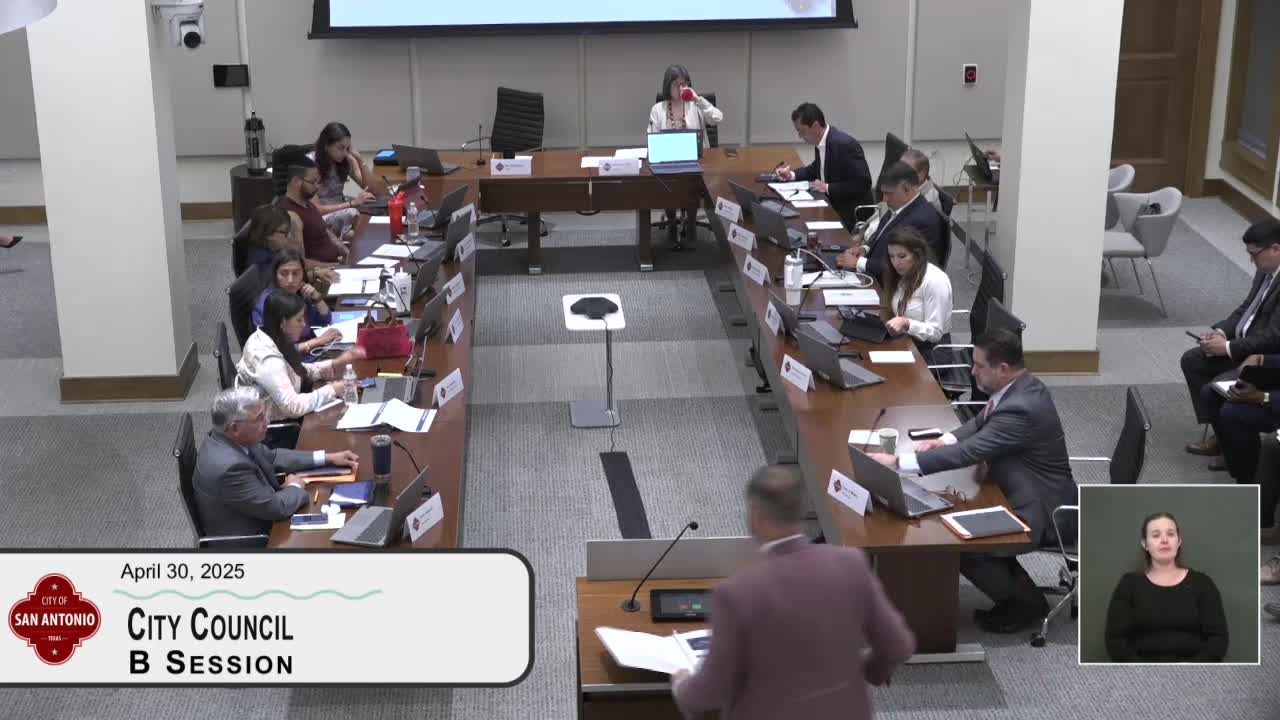San Antonio officials warn HB 19 would sharply limit local borrowing and curb capital projects
Get AI-powered insights, summaries, and transcripts
Subscribe
Summary
City officials told the San Antonio City Council on April 30 that House Bill 19, a proposed state law, would place a severe cap on local governments’ ability to issue debt and could substantially restrict San Antonio’s ability to fund capital projects such as streets, public safety facilities and other infrastructure.
City officials told the San Antonio City Council on April 30 that House Bill 19, a proposed state law, would place a severe cap on local governments’ ability to issue debt and could substantially restrict San Antonio’s ability to fund capital projects such as streets, public safety facilities and other infrastructure.
Jeff, a member of the city’s intergovernmental relations team, told the council that “it caps ... how much debt we can issue. It essentially says that you can only have debt service payments ... equal to 20% of your property tax collections in a year. Actually, it's an average over 3 years.” He said San Antonio and many other taxing entities are already above that cap and estimated the city would not fall below the cap until 2036 under the filed version of the bill.
The cap, Jeff said, could mean “no new bond programs, no other capital investments for more than a decade.” He said a substitute version under discussion would apply the cap only to new debt, which would delay but not eliminate the underlying constraint.
Why it matters: City leaders and staff emphasized that bonds and short-term debt instruments finance a wide range of investments — from road resurfacing and cybersecurity to libraries, airport and parking projects, judicial facilities and shelters. Troy Elliott, identified in the briefing as the city’s deputy chief financial officer, and other staff warned that constraining debt capacity would force reallocations from operating budgets, potentially undermine credit ratings and raise borrowing costs.
Officials described ongoing outreach to the bill’s author and committee leadership. Jeff said city officials proposed an amendment to apply the 20% cap only to debt that has not been approved by voters, noting that San Antonio voters approve bond programs at roughly 70% and that the city has maintained a consistent debt tax rate since 2004.
Other bills flagged by staff
- Telecommunications relocation costs: Staff said one pending bill would require cities to pay the cost of relocating telecommunications infrastructure during street reconstruction, a change city staff described as potentially costly. Jeff gave a concrete example: the Lower Broadway project required AT&T to relocate infrastructure at an estimated cost of $4,000,000. He warned that shifting that cost to municipalities would be “devastating.”
- Cable/franchise fee definition: A bill that narrows the statutory definition of “cable service” to exclude certain streaming or over-the-top video services has passed the Senate and is scheduled for a House hearing. Staff said mixed-service providers could argue they no longer pay franchise fees; the city estimates that change could cost about $7,400,000 per year in general-fund franchise fees and $1,700,000 per year in PEG fees for the TVSA program (about $9,100,000 total).
- Business personal property exemption: The House and Senate have filed competing measures that would increase the exemption for business personal property (inventory). Staff said the larger bill would raise the exemption from $2,500 to $250,000 and could reduce city property-tax collections by roughly $13,600,000 per year; a smaller version would lower collections by about $3,400,000 per year.
- Preemption bills and enforcement: Staff described a set of bills that extend state preemption into additional statutory chapters. Unlike prior litigation-based enforcement, these measures would give the attorney general authority to enforce violations by withholding state sales tax distributions, freezing property tax collections or cutting off state grant funding.
- Annexation/disannexation tied to utilities: One bill discussed would allow areas that do not receive municipal water or wastewater services to pursue disannexation; staff said this could threaten parts of the tax base where septic systems are still in use.
- Dangerous-dog changes: Staff said a bill heard in committee would raise penalties for repeat dangerous-dog incidents (from a class C to a class B misdemeanor in some cases) and would permit animal-care officers to rely on investigatory resources when witness affidavits are not available. The mayor’s office and staff described the hearing as productive and the measure currently pending in committee.
- Other measures: Staff noted several bills with positive or mixed impacts to San Antonio, including legislation to allow National Park Service officers to act as peace officers on federal park property (passed House), a film incentive expansion the city supports (described by staff as a roughly $500,000,000 investment statewide), and a corridor-coordination bill directing the General Land Office to coordinate the Texas Bicentennial Trail to be completed by 2036.
Council reaction and next steps
Mayor Nirenberg and multiple council members urged continued outreach to the bill author, committee chair and allied stakeholders, including chambers of commerce, banks and construction industry partners. Council members said the proposed limits would affect not just municipal projects but hospitals, school districts, community colleges and military-related infrastructure. Councilmembers urged rapid, coordinated advocacy and suggested the city marshal support from regional partners and business stakeholders.
Jeff and IGR staff said they have been meeting with the bill author’s office, convening regional calls with business partners and have shared fiscal-impact estimates with council members. The legislative session ends June 2; staff warned some measures could advance late in the session and asked council members to be prepared to advocate.
The council did not take any formal votes on these bills at the April 30 B session; staff said they will continue to update the council and circulate suggested actions for advocacy and amendments.
